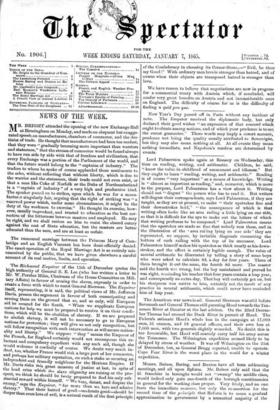The Richmond Enquirer of the 15th of December quotes the
high authority of General R. E. Lee (who has written a letter to Mr. W. Percher Miles, Chairman of the Home Committee on Mili- tary Affairs) in favour of arming the slaves, expressly in order to create a force with which to resist General Sherman. The Enquirer itself, representing, it is 'said, the political views of Mr. Jefferson Davis, presses the argument in favour of both emancipating and arming them on the ground that so, and so only, will European aid be secured for the South. " When we supplicate European nations for help we must be prepared to receive it on their condi- tions, which will be the abolition of slavery. If we are prepared to abolish slavery, it will not be. necessary to go to European nations for protection; they will give us not only recognition, but will follow: recognition with such intervention as will secure nation- ality and liberty." We suppose " they" means the Emperor of the French, for England certainly would not recompense this re- luctant and compulsory expedient with any such aid, though she would welcome it cordially of course. We doubt very much in- deed, too, whether France would risk a large part of her commerce, and perhaps her military reputation, on such a stake as securing an independent and friendly neighbour for the Mexican Empire. If Mr. Davis risks Vas great measure of justice at last, in spite of the loud cries which thri slave oligarchy are raising at the pro- spect, we think he should be tar13, prepared to find his only sub- stantial reward within himself. " Wt, Late, detest, and despise the enemy," says the Enquirer, " far more than we love and admire slavery." That' their hatred of good—moderate goOd—should be deeper than even love of evil, is a natural result of the first principle
of the Confederacy in choosing its Corner-Stone,—" Evil, be thou my Good !" With ordinary men love is stronger than hatred, and of course when their objects are transposed hatred is stronger than love.




































 Previous page
Previous page